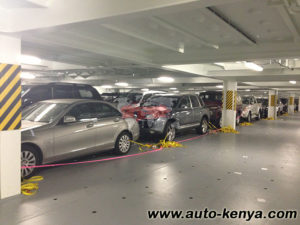
At the start of 2019, the Kenyan Government advertised the implementation of the National Automotive Policy aimed at supporting locally assembled vehicles.
To borrow from the policy, it was stated on the draft on page 28 :-
Implement a total ban on importation of used fully built units of commercial vehicles, and a phased out plan on importation of used FBU passenger vehicles. This will reduce the importation of used vehicles in the Kenyan market while facilitating the local manufacturers to assemble, and manufacture affordable vehicles for diverse domestic market segments. Towards this, the age limit of imported passenger vehicles will be progressively raised, to expand the market for locally assembled vehicles, and importation of newer FBUs, for vehicles with engine capacity exceeding 1500cc. This will be implemented from 8 year to 5 years in 2019; from 5 years to 3 years in 2021 and; from 3 years to zero in 2023. This will be reviewed from time to time. Draft 4 of National Automotive Policy Kenya for download.
This effectively meant, that players in the used car business will eventually be out of business – and vehicle assemblers who are far and few, and are not manufacturing, but merely bringing in almost-complete-units and enjoy lowered taxes, stood to gain.
The policy changes the free market that Kenya has experienced, where car imports have boomed due to the increasing rise of the middle class who are able to afford second hand vehicles imported from Japan, UK and other Import Destinations as they find new cars to be too expensive.
Changing the regulations meant:-
1. Limited choice on vehicles available in the market
2. Affordability challenges for most of the population due to the price of new cars
3. Job losses – the chain of people in the used car trade is huge and we list a few
a. Used Vehicle Dealers – typically pay premium rents for premium locations and employ at least a minimum of 5 people on their premises. Not only will the land lords suffer, however this will lead to massive job losses as car dealers are prominently found around most streets.
b. Used Vehicle Delivery Drivers – most vehicles once cleared from Mombasa are driven to Nairobi and up country, new cars will be carried on car carriers. This means we again stand to loose more jobs.
c. CFS – not only has the SGR directive affected CFS businesses, should these regulations come through it will mean further losses for the CFS operators and again more job losses as discharge operations for vessels require a lot of man power.
d. RoRo Shipping Agencies – Shipping agencies who deal with used car imports will further have to scale down their operations as they will no longer deal with the current volumes
e. Clearing Agents – Clearing agents who specialize in car imports, will either scale down or look for other cargo to clear.
f. All players involved in the Used Car Importation – from Shipping Agents, Car Sourcing Companies, Brokers, Car Insurance Companies, Vehicle Pre-Shipment Companies and the list goes on will scale down operations and this will lead to massive job losses.
4. Kenya Revenue Authority – the loss of taxes will be massive, players in the used car importation industry contribute huge sums of taxes. With revenue targets not being met, this is not the time for a policy which would put us further in the red.
5. Prices of Used Cars rising due to lack of supply
Naturally the scope of the effect of this policy is not in the scope of this article, but to say the least, the effects would be devastating.
A lot of players saw the effects of the change, and lobbied for this policy not to come through. The Kenya Auto Bazaar on the 5th of February 2019 took out a full page advert writing to the president to protest against the policy.
Unfortunately the cabinet secretary stated that the policy was still on course, even though there was a lot of resistance.
The Ministry of Industry, Trade and Cooperatives advertised for validation of the Draft National Automotive Policy to happen on the 12th of April 2019 at the KICC.
On the 12th of April, huge numbers of car dealers arrived at the KICC and with a lot of protests – the validation process did not happen.
The Kenya Bureau of Standards (KEBS) was further involved in this process, and due to the resistance it was agreed that the age limit would stay the same, however commercial vehicles is what would be affected as the assembly for these type of vehicle was possible. Clear guidelines on these are still be be provided, however we expect these regulations to go in place from the 1st of January 2020.
On the 7th of May 2019, the government announced that they are suspending their push to change the age limit of car importations.
There was a lot of celebration and as of now the status quo remains, whereby the age limit is still 8 years.
While we do not expect this to be the last of this, however we shall keep you posted on changes that happen.
We further would add, once the infrastructure to actually manufacture motor vehicles which can lead to jobs and support the big four agenda is put in place then with public participation a win-win solution can be gained. With the current market, it will mean we shall end up having monopolistic behavior due to limited players and more harm done then good.
Further information can be found out by emailing us on sales@auto-kenya.com

